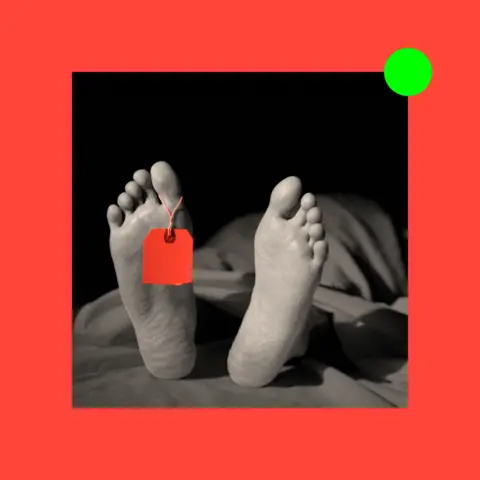Harold Dillard was 56 when he was diagnosed with an aggressive cancer around his abdomen in November 2009. Within weeks the former car mechanic and handyman - a Texan Mr Fix It type who wore a cowboy hat and jeans nearly every day - was in end-of-life hospice care.
In his final days, Mr. Dillard was visited at the hospice by a company called Bio Care. They asked if he might like to donate his body to medical science, where it could be used by doctors to practice knee replacement surgery. The company would cremate the parts of his body that weren't used and return his ashes free of charge.
His eyes lit up, his daughter, Farrah Fasold, remembers. He viewed that as lessening the burden on his family. Donating his body was the last selfless thing he could do.
Mr. Dillard died on Christmas Eve, and within hours, a car from Bio Care pulled up outside the hospice and drove his body away.
A few months later, his daughter received a call from the police. They had found her father's head.
At the company's warehouse, police say they found more than 100 body parts belonging to 45 people. All of the bodies appeared to have been dismembered by a coarse cutting instrument, such as a chainsaw, a detective wrote at the time.
Ms. Fasold says she imagined her father's body would be handled with respect - but instead, it was mutilated, she believes.
I would close my eyes at night and see huge red tubs filled with body parts. I had insomnia. I wasn't sleeping.
The company said at the time through a lawyer that they denied mistreating bodies. The firm no longer exists, and its former owners could not be reached for comment.
This was Ms. Fasold's first introduction to the world of so-called body brokers: private companies that acquire corpses, dissect them, and then sell the limbs for a profit, often to medical research centers.
For critics, the industry represents a modern form of grave-robbing. Others argue that body-donation is essential for medical research and that private companies are simply filling a gap left by universities, who consistently fail to acquire enough dead bodies to support their education and research programs.
Although Ms. Fasold didn't realize it at the time, her father's case sheds light on an emotion-fueled debate that cuts to the center of our ideas about life, and what it means to have a dignified death.
The Body Business
Since at least the 19th Century, when the teaching of medicine expanded, some scientifically-minded people have rather liked the idea that their corpse could be used to train doctors.
Brandi Schmitt is director of the anatomical donation programme at the University of California, a popular destination for people wishing to bequeath their bodies. She says they received 1,600 whole-body donations last year, and they have a list of almost 50,000 living people who have already registered to do so.
Often, body-donation is driven by simple altruism, she says: A lot of people are either educated or interested in education.
But financial factors come into play too. Funerals are expensive, Ms. Schmitt says; many are tempted by the prospect of their body being taken away for free.
Like most medical schools, the University of California does not profit from its body-donation programme, and it has strict guidelines for how corpses - or cadavers, as they are known medically - should be handled.
But in recent decades, something more controversial has emerged in the U.S.: a network of for-profit businesses that act as middlemen, acquiring bodies from individuals, dissecting them, and then selling them on. They are widely nicknamed body brokers, though the firms call themselves non-transplant tissue banks.
Some of their customers are universities, which use cadavers to train doctors. Others are medical engineering firms, which use limbs to test products like new hip implants.
The for-profit body part trade is effectively outlawed in the UK and other European countries, but looser regulation in the U.S. has allowed the trade to flourish.
A Global Trade
The trade has grown because of a gap in U.S. regulation, says Jenny Kleeman, who spent years researching the topic for her book, The Price of Life.
While the UK's Human Tissue Act makes it illegal in almost all cases to profit from a body part, no comparable law exists in the U.S. Technically, the U.S.'s Uniform Anatomical Gift Act bans the sale of human tissue - but the same law allows a charge for the processing of a body part.
These loose laws have turned the U.S. into a global exporter of cadavers. In her book, Kleeman found that one of the largest U.S. players shipped body parts to more than 50 countries, including the UK.
There is no formal register of brokers, and official statistics are hard to find. But Reuters calculated that from 2011 to 2015, private brokers in the U.S. received at least 50,000 bodies, and distributed more than 182,000 body parts.
'Bodies of the State'
For some, private body brokers represent the very worst sort of ambulance-chasing greed.
In his Reuters investigation, Mr. Grow found cases of brokers becoming intertwined with the American funeral industry via arrangements in which funeral homes introduce brokers to relatives of the recently deceased. In return, the home received a referral fee, sometimes exceeding $1,000 (£750).
After her run-in with Bio Care, Ms. Fasold hoped for a criminal prosecution. As well as the fact that her father's limbs may have been cut with a chainsaw, she was unhappy about a package she had received in the post, in a zip-lock bag, which the company claimed was her father's ashes. She says the contents did not look or feel like human ashes.
Bio Care's owner was initially charged with fraud, but the charge was later withdrawn because prosecutors could not prove an intent to deceive.
Increasingly desperate, Ms. Fasold contacted the local district prosecutor. But she was told that Bio Care had not broken any state criminal laws.
Unfairly Villainised?
But horror stories like these aside, others point out that body donation plays a crucial role in scientific discovery.
Ms. Schmitt of the University of California says that at the most basic level, bodies are used to teach doctors, or for surgeons to practice complicated operations. Often, it's the first time a medical student works with real flesh and blood - an experience that can't be replicated from a textbook.
And some of the private brokers say they are being unfairly villainised. Kevin Lowbrera, who works for one of the big body broking companies, says its accreditation by the American Association of Tissue Banks means it has to follow guidelines determining how cadavers are treated and stored. However, accreditation is voluntary.
Beyond the For-Profit Trade?
Virtually everyone I speak to - on all sides of the debate - thinks that more regulation in the U.S. is needed.
Ms. Schmitt suggests the U.S. could perhaps follow European countries and ban for-profit body broking. She says there are some legitimate costs that come with processing a body - like spending on transport and preservative chemicals. It's reasonable for companies to charge for these, she says. But the idea of actually making a profit makes many feel squeamish.
It's also possible that advances in virtual reality (VR) technology mean that cadavers simply won't be needed in the future. A trainee doctor could put on a headset and practice on a computer-generated patient.
Real human bodies preserve the body's colours and textures, which can make it difficult to discern, say, a nerve from a blood vessel. But for the time being, it seems, there will remain a demand for human bodies - as well as money to be made.






















